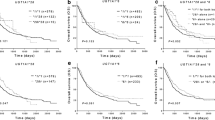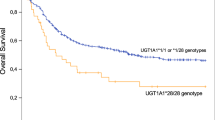Abstract
The uridine diphosphate glucuronosyltransferase (UGT) gene 1A1*6 polymorphism, which affects irinotecan metabolism, has been associated with improved survival in lymphoma patients treated with of carboplatin, dexamethasone, etoposide and irinotecan (CDE-11). This study assessed the efficacy of CDE-11 relative to the UGT1A1*6 polymorphism in 27 elderly patients with relapsed or refractory diffuse large B-cell lymphoma who were ineligible for high-dose chemotherapy plus autologous stem cell transplantation. The 2-year survival rate after initial CDE-11 treatment was significantly higher in patients with than without UGT1A1*6 (57% vs. 5%). The most common grade 4 adverse event in patients with the UGT1A1*6 genotypes was neutropenia (88.9%), but there were no gastrointestinal adverse events or treatment-related deaths. Disease progression was the most frequent cause of death. CDE-11 was well tolerated and provided clinical benefit to elderly patients with relapsed or refractory diffuse large B-cell lymphoma. The response to CDE-11 likely correlated with UGT1A1*6 polymorphisms, but further prospective studies are warranted to optimize irinotecan-based chemotherapies relative to UGT1A1 polymorphism.

Similar content being viewed by others
References
Haioun C, Lepage E, Gisselbrecht C, Salles G, Coiffier B, Brice P, BoslyA MP, Nouvel C, Tilly H, Lederlin P, Sebban C, Brière J, Gaulard P, Reyes F (2000) Survival benefit of high-dose therapy in poor-risk aggressive non-Hodgkin’s lymphoma: final analysis of the prospective LNH87-2 protocol—a groupe d’Etude des lymphomes de l’Adulte study. J Clin Oncol 18:3025–3030
Sarkozy C, Coiffier B (2013) Diffuse large B-cell lymphoma in the elderly: a review of potential difficulties. Clin Cancer Res 19:1660–1669
Suzumiya J, Suzushima H, Maeda K, Okamura S, Utsunomiya A, Shibuya T, Tamura K; Kyushu Hematology Organization for Treatment Study Group (2004) Phase I study of the combination of irinotecan hydrochloride, carboplatin, and dexamethasone for the treatment of relapsed or refractory malignant lymphoma. Int J Hematol 79:266–270
Mathijssen RH, van Alphen RJ, Verweij J, Loos WJ, Nooter K, Stoter G, Sparreboom A (2001) Clinical pharmacokinetics and metabolism of irinotecan (CPT-11). Clin Cancer Res 7:2182–2194
Liu X, Cheng D, Kuang Q, Liu G, Xu W (2013) Association between UGT1A1*28 polymorphisms and clinical outcomes of irinotecan-based chemotherapies in colorectal cancer: a meta-analysis in Caucasians. PloS One 8:e58489
Araki K, Fujita K, Ando Y, Nagashima F, Yamamoto W, Endo H, Miya T, Kodama K, Narabayashi M, Sasaki Y (2006) Pharmacogenetic impact of polymorphisms in the coding region of the UGT1A1 gene on SN-38 glucuronidation in Japanese patients with cancer. Cancer Sci 97:1255–1259
Han JY, Lim HS, Shin ES, Yoo YK, Park YH, Lee JE, Jang IJ, Lee DH, Lee JS (2006) Comprehensive analysis of UGT1A polymorphisms predictive for pharmacokinetics and treatment outcome in patients with non-small-cell lung cancer treated with irinotecan and cisplatin. J Clin Oncol 24:2237–2244
Kobayashi M, Hazama S, Takahashi K, Oba K, Okayama N, Nishioka M, Hinoda Y, Oka M, Okamoto K, Maeda H, Nakamura D, Sakamoto J, Mishima H (2012) Is there diversity among UGT1A1 polymorphism in Japan. World J Gastrointest Oncol 4:170–175
Cheson BD, Pfistner B, Juweid ME, Gascoyne RD, Specht L, Horning SJ, Coiffier B, Fisher RI, Hagenbeek A, Zucca E, Rosen ST, Stroobants S, Lister TA, Hoppe RT, Dreyling M, Tobinai K, Vose JM, Connors JM, Federico M, Diehl V; International Harmonization Project on Lymphoma (2007) Revised response criteria for malignant lymphoma. J Clin Oncol 25:579–586
Kano Y, Suzuki K, Akutsu M, Suda K, Inoue Y, Yoshida M, Sakamoto S, Miura Y (1992) Effects of CPT-11 in combination with other anti-cancer agents in culture. Int J Cancer 50:604–610
Acknowledgments
We thank the patients and clinical staff for their participation in the study. The authors also acknowledge the Clinical Research Institute, Kyushu Medical Hospital, for editorial support.
Conflict of interest
The authors declare that they have no conflict of interest.
Author contributions
S.Y. contributed to the study design, data analysis, and manuscript preparation; K.T., K.K., M.K., K.T, S.K., A.K., M.T., and S.O. reviewed the manuscript.
Author information
Authors and Affiliations
Corresponding author
Electronic supplementary material
Below is the link to the electronic supplementary material.
ESM 1
(DOCX 19 kb)
Rights and permissions
About this article
Cite this article
Yamasaki, S., Tanimoto, K., Kohno, K. et al. UGT1A1 *6 polymorphism predicts outcome in elderly patients with relapsed or refractory diffuse large B-cell lymphoma treated with carboplatin, dexamethasone, etoposide and irinotecan. Ann Hematol 94, 65–69 (2015). https://doi.org/10.1007/s00277-014-2170-5
Received:
Accepted:
Published:
Issue Date:
DOI: https://doi.org/10.1007/s00277-014-2170-5




